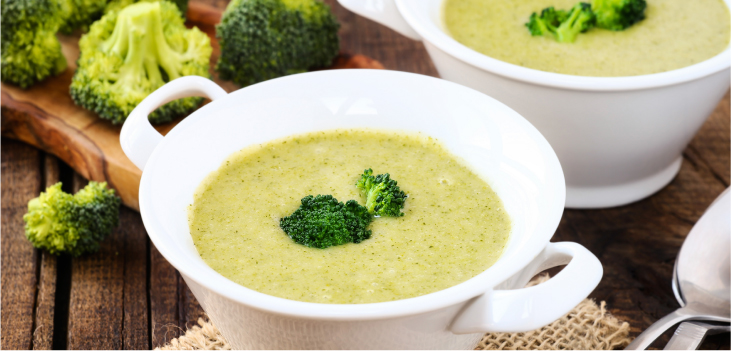January is Cervical Health Month—Time to Make Nutrition a Priority
Posted by in Uncategorized
As our journey into the new year begins full steam, amid resolutions, renewed energy, and determination, we are reminded that January is Cervical Health Month. We are bombarded with information about cervical cancer, screenings, tests, vaccines, and statistics—all important information. Yet, despite what we have learned from the media, the risk of cervical cancer goes beyond the human papillomavirus (HPV) infection. In fact, epidemiological (population observation) studies have revealed that nutrition is important, not only for maintaining the health of the cervix but also for having a suppressive effect on HPV infection.
How can we be proactive about this revelation? We can make health and immunity a central part of our journey to successful aging.
Don your lab coat for a moment and stay with me—I promise to bring it back to earth with a recipe.
The Importance of Plant-Based Antioxidants
The benefits of eating an abundance of organic vegetables as well as a modest amount of organic low-glycemic fruits cannot be overstated. No genetically modified organisms (GMOs) here!
The antioxidant potential of certain phytonutrients, such as alpha and beta carotene (found in carrots), lycopene (found in tomatoes), lutein (found in leafy green vegetables), ellagic acid (found in raspberries), zeaxanthin and cryptoxanthin (found in papayas), astaxanthin (found in wild salmon), sulforaphane glucosinolate and indole-3-carbinol (found in the cruciferous vegetables), and epigallocatechin gallate (EGCG) (found in green tea), helps kill free radicals, supports detoxification, dampens the proliferative effect of estrogen, reduces the virulence of HPV, reduces the risk of cervical cancer, inhibits cancer cell proliferation, and induces apoptosis (programmed cell death) of cervical cancer cells.
Methylation and its role in suppressing cancer
The metabolic process known as methylation plays an important role in the suppression of tumor growth. The bioactive forms of folic acid and vitamin B12, 5-methyltetrahydrofolate (5MTHF) and methylcobalamin, participate in methylation, a very important epigenetic cellular metabolic event that silences or turns off gene expression to estrogen metabolism. It also affects our moods/emotions and bone and cardiovascular health. The accumulation of homocysteine, an intermediate molecule present in the metabolic pathway resulting in methylation, implies a lack of efficiency in the pathway. Methylation feeds into a related metabolic pathway resulting in the production of the body’s most important antioxidant/detoxification molecule, glutathione. In addition, glutathione suppresses viral DNA replication, regulates apoptosis, and activates the P53 tumor-suppressor gene, all of which impact the risk and progression of cervical cancer.
Impaired methylation, resulting in high serum homocysteine levels and low glutathione levels, is associated with a greater risk of cervical cancer and a more persistent presence of HPV.
Refined Carbohydrates and Sugars
The consumption of refined carbohydrates and sugars results in an increase in blood glucose and insulin levels—which feeds cancer cells.
Cancer cells are obligate sugar feeders, thriving on blood glucose and modifying their energy metabolism to minimize the production of free radicals, one of the by-products of energy metabolism. Elevated blood glucose results in an increased production of insulin and insulin-like growth factors, which promote inflammation and contribute to cancer cell division and tumor growth. Substituting organic, non-GMO whole grains, such as wild rice, quinoa, and teff, rich in nutrients, fiber and protein, with a good amount of healthy fats minimizes the blood sugar-insulin effect and protects against the formation of cancer cells.
Choose organic non-GMO, free-range, grass-fed, hormone- and antibiotic-free foods to promote healthy bodies. While more expensive, they are also more nutritious and free of toxins that can trigger and contribute to cancer.
Organic fruits and vegetables contain more anti-cancer phytonutrients, while grass-fed, hormone- and antibiotic-free animals have a higher profile of omega-3 fatty acids, less saturated fat, and are less toxic/sick themselves.
As promised, let’s now bring it back to earth, or rather, your kitchen table. These two scrumptious dishes not only represent much-needed comfort food during this cold season but also are medicine for the body and soul, helping to strengthen and support the lessons learned this month.
Be well!
Broccoli Zucchini Soup
- ½ organic white or yellow onion, chopped
- 3-4 stalks organic celery, chopped
- 1 bag shredded organic broccoli stalks
- 2 organic vegetable bouillon cubes
- 2-3 bags of organic broccoli florets or 2 bunches organic broccoli, cut up
- 6 medium organic zucchinis, sliced thick
- 2 organic low-sodium vegetable bouillon cubes
- 8-12 cups of boiled water
Rinse and prepare all vegetables.
Place chopped onion, celery, broccoli stalks, and bouillon cubes in a soup pot.
Add just enough water to cover vegetables.
Bring to a boil, reduce heat, and cook until onions are glassy, adding water as needed.
Add all remaining ingredients.
Bring to a boil, cover, and reduce heat.
Cook until vegetables are soft, about 20 to 30 minutes.
Remove from heat, allow to cool, and puree.
Note
If you prefer more salt, use 3 organic vegetable bouillon cubes and 1 low-sodium cube.
Variation
Add 1 packet frozen artichoke hearts when you add the broccoli and zucchini.
Turkey Meatloaf
- Organic olive oil
- 4 bay leaves
- 2 packets Plainville or other hormone/antibiotic-free ground turkey
- 1/2 medium purple onion, chopped
- 2 organic eggs, beaten
- 1 14-ounce can of organic diced tomatoes with Italian herbs
- 1/4 cup gluten-free bread crumbs
- Garlic and onion powder to taste
- Himalayan salt to taste
Preheat an oven to 350ºF.
Coat the bottom of a meatloaf baking dish with olive oil and add the bay leaves.
Place all remaining ingredients in a mixing bowl and mix, using a spatula, till well combined.
Place ingredients in the baking dish and brush with oil.
Bake in the preheated oven for 50 to 60 minutes.
Serving Ideas
Serve with cauliflower mash, steamed green beans, and mixed-leaf salad (baby romaine, arugula, endive, and radicchio).
Bon Appetite!
(originally posted January 14th, 2016 on boomspot)
You can follow any responses to this entry through the RSS 2.0 You can leave a response, or trackback.



Leave a Reply